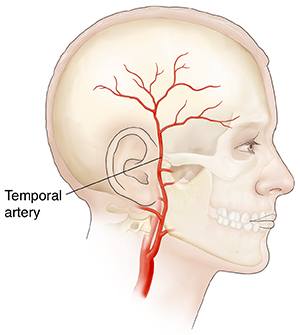You have temporal arteritis (also called giant cell arteritis). This is an inflammation of the blood vessels that supply the head, neck, upper body, and arms. It can be diagnosed by examining a small piece of temporal artery, which is easily accessible. This artery is located in the scalp area just above each ear. When the arteries are inflamed, the vessel narrows, and blood flow slows down. A clot may also form inside the artery, stopping all blood flow. Reduced or blocked blood flow in the arteries that supply vital structures in the eye can cause blindness in the affected eye. In rare cases, stroke may occur.
Healthcare providers don't know what causes temporal arteritis. Symptoms include headache, tenderness of the temples or scalp, jaw pain when chewing, muscle aches, tiredness (fatigue), fever, and unintentional weight loss.
Steroids, such as prednisone, are used to treat this condition. These reduce inflammation in the arteries. Most people start to feel better a few days after treatment starts. Most people do recover from this condition, but it may need continued treatment for 1 or 2 years. Long-term steroid treatment can cause various serious side effects. These include osteoporosis, high blood pressure, and diabetes. Talk to your healthcare provider about side effects and ways to minimize them.
Home care
Take medicines as directed by your healthcare provider. These suggestions will help reduce side effects from long-term steroid use.
Nutrition
-
Eat plenty of fresh fruits, vegetables, and whole grains.
-
Choose mostly lean sources of protein.
-
Limit the use of salt, sugar, and alcohol.
-
Be sure to get enough calcium and vitamin D. Low-fat dairy foods are an excellent source of these nutrients. If you are not able to eat dairy, you can choose lactose-free products instead. Here are some other foods that contain calcium:
-
Kale and broccoli
-
White beans, green beans, and lima beans
-
Salmon
-
Soybeans or tofu
-
Fortified juices
-
You can also take daily calcium supplements. Ask your healthcare provider how much calcium you should take each day.
-
Exercise
Get regular aerobic exercise, up to 30 minutes on most days. Exercise can help prevent bone loss, heart disease, and diabetes. It also relieves stress and can improve your mood and your overall quality of life. If you don’t already exercise regularly, ask your healthcare provider for help setting up a program.
Follow-up care
Follow up with your healthcare provider, or as advised.
When to seek medical advice
Call your healthcare provider right away if any of the following occur:
-
Worsening symptoms
-
Numbness or weakness of the face, one arm, or one leg
-
Slurred speech, confusion, or trouble speaking or walking
-
Severe headache
-
Fainting spell, dizziness, or seizure
-
Pain in the chest, arm, neck, or upper back
-
Sudden loss or change in vision


